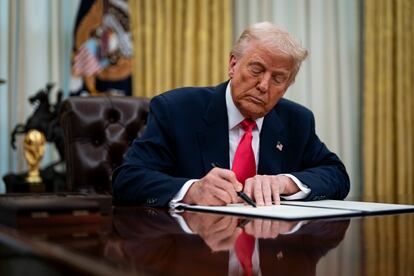Trump claims to have sent a letter to Iran to negotiate a nuclear deal
The US withdrew from the nuclear deal negotiated by the Obama administration and European partners in 2018, during Trump’s first term


U.S. President Donald Trump says he wants to negotiate a nuclear deal with Iran and sent a letter this week to the country’s leaders inviting them to open talks, in a further step in a series of initiatives that are changing traditional U.S. foreign policy from top to bottom. “I said, ‘I hope you’re going to negotiate,’ because it will be a lot better for Iran,” the Republican said in an interview with Fox Business aired Friday.
The United States withdrew from the nuclear deal negotiated by the Barack Obama administration and European partners in 2018, during Trump’s first term, arguing that the pact was too beneficial to Tehran and opened the door to the regime’s ability to arm itself with nuclear weapons to attack Israel if it failed to comply with the terms of the pact. In fact, the negotiations that led to that agreement had begun with a letter from Obama in 2009 to the Iranian government.
“I think they want to get that letter. The other alternative is we have to do something because you can’t let them have a nuclear weapon,” the U.S. president said in the interview, reiterating his refusal to let another country become a nuclear power. Trump did not specify exactly to whom his letter was addressed, but it could be to Iranian Supreme Leader Ayatollah Ali Khamenei. The U.S. president had already expressed his interest in reaching some kind of agreement with Iran in February, which he considers to be weakened after the failures of its attacks against Israel and the blows to the Islamist groups it backs (Hezbollah in Lebanon and Hamas in Gaza).
After the 2018 debacle, the Democratic administration of Joe Biden had tried to salvage the nuclear deal, known as the Joint Comprehensive Plan of Action (JCPOA), and to establish confidence-building measures with Iran. But the Hamas attack on Israel on October 7, 2023, which sparked the war in Gaza, scuttled any attempt at rapprochement. In the meantime, the Islamic Republic has been steadily accelerating its uranium enrichment program, which U.S. intelligence services consider to be well advanced. Both Israel and the United States have assured that they will not tolerate a nuclear-armed Iran.
The question of a possible new nuclear deal with Iran had come up in the U.S.-Russia talks held two weeks ago in Saudi Arabia to explore a way out of the war in Ukraine, in another of the Republican administration’s steps to make a 180-degree turn on a foreign policy that until now had been one of unconditional support for Kyiv and isolation of Moscow. Trump had also raised his administration’s interest in negotiating with Tehran on this possible pact and the regime’s support of Islamist groups in the Middle East during his phone call, a week earlier, with Russian President Vladimir Putin. Moscow had expressed its willingness to cooperate.
Following those talks, Russian Foreign Minister Sergey Lavrov, who headed his country’s delegation, traveled to Tehran to meet with his Iranian counterpart, Abbas Araghchi. According to what the head of Iranian diplomacy declared afterwards, Lavrov informed him of the details of the meeting he had held in Riyadh with the Americans. This Friday, the Russian ministry indicated that its number two, Sergey Riabkov, had discussed international efforts to resolve the situation surrounding the Iranian nuclear program with Iranian ambassador Kazem Yalali.
“There are two ways Iran can be handled, militarily or you make a deal,” Trump said in his interview with Fox Business. “I would prefer to make a deal, because I’m not looking to hurt Iran. They’re great people.”
And, he insisted, “I’m not sure that everybody agrees with me, but we can make a deal that would be just as good as if you won militarily. But the time is happening now, the time is coming up. Something is going to happen one way or the other.”
The JPOEA, signed in 2015 between Iran and a number of international powers, provided for relief from certain sanctions imposed against Tehran, worth billions of dollars, in exchange for Iran dismantling part of its nuclear program and subjecting it to the control of the international community.
Sign up for our weekly newsletter to get more English-language news coverage from EL PAÍS USA Edition
Tu suscripción se está usando en otro dispositivo
¿Quieres añadir otro usuario a tu suscripción?
Si continúas leyendo en este dispositivo, no se podrá leer en el otro.
FlechaTu suscripción se está usando en otro dispositivo y solo puedes acceder a EL PAÍS desde un dispositivo a la vez.
Si quieres compartir tu cuenta, cambia tu suscripción a la modalidad Premium, así podrás añadir otro usuario. Cada uno accederá con su propia cuenta de email, lo que os permitirá personalizar vuestra experiencia en EL PAÍS.
¿Tienes una suscripción de empresa? Accede aquí para contratar más cuentas.
En el caso de no saber quién está usando tu cuenta, te recomendamos cambiar tu contraseña aquí.
Si decides continuar compartiendo tu cuenta, este mensaje se mostrará en tu dispositivo y en el de la otra persona que está usando tu cuenta de forma indefinida, afectando a tu experiencia de lectura. Puedes consultar aquí los términos y condiciones de la suscripción digital.








































